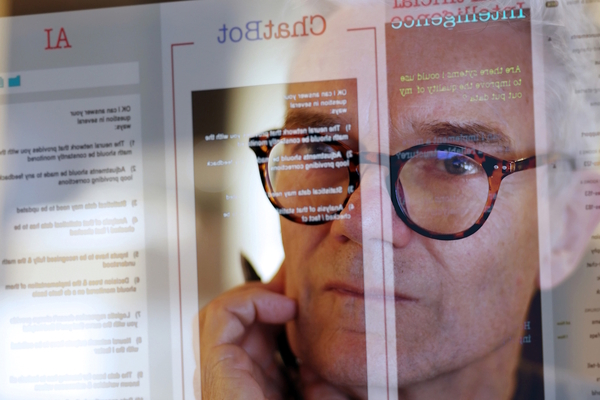American View: What Should You Be Watching Out for In Your Next Job Interview?

How quickly we forget ... I remember when I received my first training in how to interview for a corporate gig. I was mustering off active duty and hoped to get a job that would allow me to be a sole breadwinner so my wife could look after our two-year-old. The firm I’d engaged promised to get me at least eight and possibly as many as twelve interviews, all with FORTUNE 500 companies. That was our dream: get off the Army’s random deployment cycle and finally get a stable, reasonably predictable family life.
The placement firm’s consultants provided me a crash-course in corporate interview techniques, complete with blistering – merciless, even – feedback on my practice interviews. I wanted to believe I was getting the best advice possible from certified experts. It wasn’t like my parents, relatives, or professors could teach me anything about it since none of them had ever worked in the corporate world (let alone interviewed in it).
In retrospect, most of the advice I got from the “experts” turned out to be self-defeating: pretend to be someone you’re not. Suck up to the interviewer. Agree to anything the interviewer says. Lie about your qualifications and preferences. Take whatever job is offered. I should have realized that a job placement agency makes their money by getting a “cut” of each candidate’s starting salary; their priority was to get butts in seats, full stop. They didn’t give a damn about us candidates. We were the product in their business model, not the customer.
Nonetheless, I played their game and got what should have been a prestige gig as a technology consultant during the first Dot Com Boom. Except that I was “sold” inside my employer’s firm from the partner I’d interviewed with to a completely different partner less than fifteen minutes into my first day with the firm. Things went downhill from there.
After a few miserable years working a job I hated, I learned how to interview through trial and error (mostly error). It wasn’t until I switched to the other side of the table and stated evaluating prospective hires that I understood what I should have been saying as a candidate … and what I should have been listening for from my interviewers. I could’ve saved myself a lot of grief if I’d known how to spot and evade the “red flags” that reveal a caustic work environment.

This topic came to mind two weeks ago when my pal Becca from Tuesday Digital forwarded me a press release written by one of her clients [1] called “Interview Red Flags.” I mean … c’mon! How was I not going to read that? Becca knows me well enough to cater to my weird niche interests. She knew I’d be hooked by the title alone.
The original article is by Cristiano Winckler, the Director of Digital Ops at Somebody Digital (whoever they are). I couldn’t find the original PR and the article doesn’t appear on SD’s ‘blog, so … Maybe reach out directly to Cristiano if you’re interested in reading the full article. Or ping Becca and she’ll get you squared away.
I won’t recount the entire piece. For my money, the most relevant section in Cristiano’s article was the category titled Minimal Information. He wrote: “Vague job descriptions cast a wider net and can attract more applicants, but your interviewer should be able to answer all questions you have about the role and responsibilities. Being evasive about details suggests issues – what don’t they want to you to know? It could mean that they are downplaying negative aspects of the role or the company itself, hiding high turnover of staff, or bad company culture.” [3]
This is one of the key arguments I made in my book Why Are You Here? … An interview is an exchange of information that benefits the folks on both sides of the table. Sure, the interviewer is evaluating you as a possible fit for their open role, but at the same time you’re interviewing them as the personification of their organisation. If you don’t like what you hear from the interviewer, disengage! A company that sends an unqualified, unprofessional, or unlikeable ambassador to woo new talent isn’t an org you want to join.
That doesn’t mean that an interviewer who’s crystal clear about their organisational culture and expectations means there will be a good fit. One of my favourite examples of this is found in a passage from one of my April 2016 columns [4] titled For a Fistful of Billable Hours:

“I applied for a few leadership gigs at a huge national consulting firm a while back and managed to snag a pre-interview with an HR rep we’ll call Bethany. Throughput our discussion, Bethany focused on my sales experience instead of my consulting experience for what was supposed to be a consulting team leadership role. When I pressed her on why she seemed to be over-focusing on a peripheral aspect of the job, Bethany admitted that her firm expected all of their team members to be salespeople first and to only be consultants second (if at all!). In her company’s culture, if you didn’t hit your targets for new sales every month, you’d be terminated for non-performance. I asked some clarifying questions, and learned that Bethany’s corporate culture was so broken that they didn’t care if an employee failed to deliver a service that a client had already paid for; the only thing important to them was the next sale. Bethany was actually refreshingly candid about her firm’s callous disdain for their customers.”
I called this interview a “win.” True, I didn’t receive a job offer from this company, which was fine by me. What I needed to know as a candidate was whether I’d want to work with these people if they offered me a gig. Bethany helped me recognise that I wanted nothing at all to do with them … not as a worker, not as a customer, and not as a service provider. I learned that these people were utterly toxic and should never be trusted. All they wanted was their next contract.
That’s what I mean when I say that the candidate is interviewing their interviewer. There are far too many jobs out there that are going to be worse for you than being unemployed. In nearly every case, this is because of the organisation’s people and dysfunctional culture, not their industry, function, or products.
According to the US Bureau of Labor Statistics, the unemployment rate in July was only 4.3% There are decent jobs out there. It might take some work to find them, but they exist. I wish I’d know that there’s no good reason to jump at the first offer you get if the offer comes from an organisation that’s likely to abuse its workers, body and soul. Unless you’re absolutely desperate and have depleted your reserves, give the jerks a miss and try again somewhere else.
[1] This isn’t an endorsement since I’ve never met any of these folks in my life [2]
[2] I thought I might have for just a second; they have a listing under their “Awards & Recognition” section under About Us called “UK Digital Growth Awards” … I misread the text and thought it said “UK Digital Goth Awards.” Oh, well. ☹
[3] Emphasis added. [4] It’s no longer on the Internet, but you can find the complete column (with annotations!) in my book Office Cowboys: Cautionary Tales from the Cubicle Frontier.

Keil Hubert
You may also like
Most Viewed
23-29 Hendon Lane, London, N3 1RT
23-29 Hendon Lane, London, N3 1RT
020 8349 4363
© 2024, Lyonsdown Limited. Business Reporter® is a registered trademark of Lyonsdown Ltd. VAT registration number: 830519543





